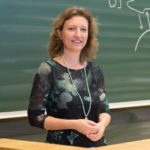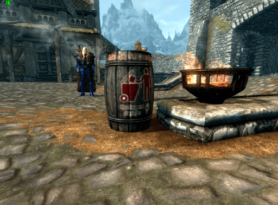Symposium: EcoPlay
Time: October 17th (9.00-13.00)
Location: Instituto Cervantes, Domplein 3, Utrecht
On October 17th, 2019, the Utrecht Center for Game Research organized a symposium on EcoPlay, i.e. the use of games and playful interventions to research and teach environmental issues, facilitate more sustainable lifestyles, and promote social change.
Across seven presentations (incl. short Q&A sessions), the topic was approached from four interrelated perspectives:
a) Top-down applications of Ecoplay, e.g. in academia and policymaking,
b) Bottom-up approaches such as ecomodding and climate game jams,
c) Games for Change, with a particular focus on persuasive/educational games,
d) Science-fiction storytelling in Ecogames as well as other Green Media.
Program
08.45-09.15: Coffee
09.15-09.30: Opening Joost Raessens: EcoPlay – Games of multitude
 Assistant Professor of Foresight and Anticipatory Governance, Copernicus Institute of Sustainable Development at the Faculty of Geosciences, Utrecht University.
Assistant Professor of Foresight and Anticipatory Governance, Copernicus Institute of Sustainable Development at the Faculty of Geosciences, Utrecht University.
Summary: Joost will discuss the potential of games as a way to engage with governance challenges in the face of global environmental change, offering an overall perspective and providing several complementary examples from his own projects.
 PhD researcher, Urban Futures Studio & Copernicus Institute of Sustainable Development, Utrecht University.
PhD researcher, Urban Futures Studio & Copernicus Institute of Sustainable Development, Utrecht University.
Summary: In her talk, Astrid will discuss 1) her research on game-based experimentation with local food system transformations; and 2) her on-going research into the Utrecht 2040 location-based game for Utrecht University students. She will discuss how these very different game-based processes have potential to create change in different ways, and how she investigates whether and how this potential is being realized.
 Associate Professor Environmental Sciences at the Copernicus Institute of Sustainable Development, Faculty of Geosciences, Utrecht University.
Associate Professor Environmental Sciences at the Copernicus Institute of Sustainable Development, Faculty of Geosciences, Utrecht University.
Senior Fellow at the Center for Academic Teaching, Utrecht University.
Summary: Utrecht University expressed in its strategic plan for 2016-2020 that ‘All students will become acquainted with sustainability issues as part of their curriculum’. To contribute to this, Karin worked together with Joost Vervoort, Astrid Mangnus, Margien Bootsma and the game company IJsfontein to develop Utrecht 2040. In her talk, Karin will show the ideas and structure behind Utrecht 2040, and about the first experiences in the implementation into different teaching programs.
 Associate Professor for New Media & Game Studies, Utrecht University.
Associate Professor for New Media & Game Studies, Utrecht University.
Summary: The presentation aims to outline ecomodding, i.e. the exploration of ecocritical concepts and policies by modifying commercial off-the-shelf computer games, as a creative humanities research method, and conceptualizes ecomodding communities around game series like Civilization and The Sims as cultural public spheres that afford productive, ongoing conversations about difficult issues in environmental communication. Drawing on own ecomodding experiments and a diachronic perspective on procedural rhetoric, I will make suggestions on how to refine the ‘language’ of ecomodding and how the method can promote a shift to less agonistic concepts of game-based persuasion such as Burke’s notions of identification and consubstantiality.
11.00-11.30: Coffee Break
 Full Professor and Chair of Media Theory, Utrecht University
Full Professor and Chair of Media Theory, Utrecht University
Summary: Climate change is one of the most pressing socio-political issues of our time. On the basis of examples of so-called ecogames, the possibilities and limitations of games and play to make people become ecological citizens will be discussed. Joost will argue that ‘games of ecology’ (ecogames) need to be considered in relation to the ‘ecology of games’ – i.e. production, text, reception, socio-political context. We need to – acknowledge the necessity for a broad and diverse understanding of types of impact – on an individual, community and societal level – in order to come to grips with the complexity of this issue.
 Student of New Media and Digital Culture, Utrecht University
Student of New Media and Digital Culture, Utrecht University
Summary: In her presentation, Hanna will discuss why a sandbox city life simulation games such as Block’hood can be used as a tool to increase the participation of citizens in the planning of their cities and ultimately, how such game can contribute to the solving of the problem of unsustainable urbanisation.
 Student of New Media and Digital Culture, Utrecht University
Student of New Media and Digital Culture, Utrecht University
Summary: The presentation investigates Ant Forest, a game embedded in online payment platform Alipay. When users perform low-carbon activities they receive green energy points, which can be used to plant a virtual tree in Ant forest. Every time you succeed in planting a tree Alibaba will plant a tree in the real world.
 Professor, Macromedia University of Applied Sciences (Leipzig, Germany)
Professor, Macromedia University of Applied Sciences (Leipzig, Germany)
Summary: Science fiction and ecological discourse are often two intertwined phenomena. They aim at the betterment of human social affairs and their relation to the natural environment while offering imaginary and practical solutions to contemporary problems. Becoming involved in SF worlds, players venture on an exploration of the unknown and become involved in alternative worlds that are negotiations of contemporary problems. This talk aims to shed light on how the act of play may foster an ecological counter-discourse to current world pollutions. It will explore how different nature/culture concepts are ingrained in the gameworld, its characters and plot, and are negotiated through play.
 Assistant Professor, Department of Information and Computing Sciences, Utrecht University
Assistant Professor, Department of Information and Computing Sciences, Utrecht University
Researcher, WEnR (Wageningen Environmental Research)
Summary: Literature on the design of persuasive and educational Games for Change often show an optimistic view, discussing the potential effects of games with generally little attempt to substantiate the intended effects on awareness, behaviour change or learning. Theories on persuasive strategies and motivational factors are often applied in the implementation of games; in this presentation we will explore methods and techniques to evaluate the effectiveness of these theories.


